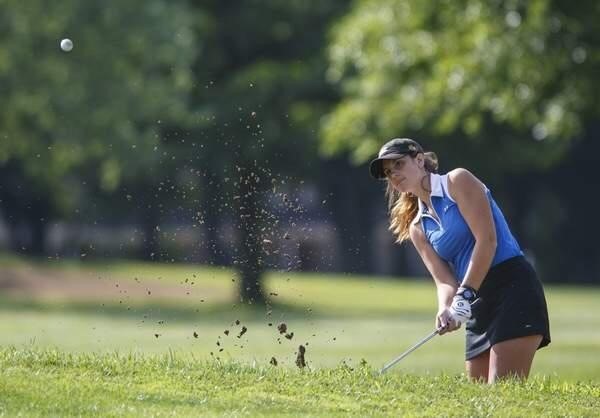Writer Tom Scanlon
[dropcap]A[/dropcap]t 16 years of age, Joelie Bennett was already a force to be admired, a budding golf goddess. Tall and trim, the long-haired brunette with a sweet swing was powering drives farther than grown women — and, for that matter, many men. Her grades in advanced placement and honors classes proved her brainpower and she was getting in-house instruction from her mother, Nichole Grover, an Anthem golf pro and top-notch player.
Joelie really had only two opponents, both formidable: her mind and her body.
The first part is relatively simple to identify, and quite common. On a hot day in late April, Nichole was on the Persimmon course at Anthem Golf and Country Club after Joelie’s school day had ended, working with her daughter on the mental part of golf, a sport that can bring strong-willed adults to their knees in frustration.
“I need to get out of my own head,” Joelie said, shooting her mother a knowing look. Nichole said she works with just about all of her students on keeping a cool, crisp mind while playing; having confidence and repeatedly saying, “I can do this,” as opposed to the opposite attitude that lets the twin devils of self-doubt and second-guessing slowly erode their games.
Just a shade under 6 feet tall, the powerful Joelie spent her Boulder Creek High School golf career blasting the ball far past her opponents. Yet she never felt she reached her full potential, as she often let her mind get in the way of her medium and short game.
While just about anyone who has played 18 holes can relate to that, the other thing that held Joelie back was a rare and baffling physical condition. She would feel great one day, then struggle to get out of bed the next. Why did she keep getting sick?
“It’s been such a roller coaster, the last four years,”
“There were two entire months,” her mother added, “when we thought she had leukemia.”
Thankfully, that was a misdiagnosis. Finally, her true condition was discovered: hypogammaglobulinemia. The complex condition boils down to the body not producing and sustaining enough antibodies, which fight infections.
“Health wise, she is getting there,” her mother said. “After her four-and-a-half-year battle, we finally got a diagnosis, thank goodness.”
With the correct diagnosis came a plan of action: Joelie began receiving blood transfusions, which greatly improved her strength and ability to stay healthy. She had a solid beginning to her senior year of golfing, with two low medalist tournaments and an even par average. Midway into the season, however, side effects from a transfusion sent her to the hospital. Joelie had qualified for the state golf tournament, but was weakened by her hospital detour and didn’t finish as high as she had hoped.
Even so, more good news came late in Joelie’s senior year, when she was offered a golf academic scholarship to attend Millersville University, located 80 miles west of Philadelphia in the rural part of Pennsylvania.
But Joelie’s condition requires weekly transfusions, so how would that work? Nichole went back and forth on this question, wanting to support her courageous daughter’s opportunity but also wrestling with who would drive her to and from the doctor’s office for transfusions, what kind of transportation backups had to be in place, and more.
A promising solution came after consultations with her doctors: Joelie could do the transfusions herself, using a pump and the plasma that is mailed to her.
Joelie tried it on her own a few times and is not having trouble injecting herself with needles and operating a pump. It makes life so much easier, she says, and her life is about to get even more interesting. The new BC graduate’s plan is to spend most of her summer golfing in tournaments around the country. Then, she’ll be off to begin a college golfing career. While she’ll miss her daughter, Nichole is eager to have Joelie receive instruction from outside her family.
Though Joelie admits advice from her mother often goes in one ear and out the other, Joelie calls her mother “my rock,” and clearly has great admiration for her. She is a constant source of encouragement and, as a player, “she’s incredible,” Joelie said.
“I beat her one time on nine holes; I talk about it every time I get the chance,” she added.
What part of her mother’s game does Joelie most admire?
“Her attitude,” Joelie said. “I think I have a good attitude; I used to have a bad attitude and no one wanted to play with me because I was kind of a brat. Now my sportsmanship is the best part of my game, but I’m nothing like my mom. She’ll hit a bad shot and still be smiling.”
Nichole, in turn, is proud of Joelie’s golf game, but beams most when thinking of her daughter’s off-course achievements.
“After missing more than 90 days of school the past four years,” Nichole said, “she maintained a 3.8 GPA.”
Late in her senior year, Joelie raised $1,000 for Phoenix Children’s Hospital with a powder puff football game that drew 200 spectators at the community center.
“I call her my Energizer Bunny,” her mother said.
Though he is just getting to know her, that admiration is already shared by Scott Vandegrift, who has been coaching at Millersville for 31 years (the last six as both the men’s and women’s coach). Joelie already stands out, even at the college level.
“I’ve never had a girl this tall,” the golf coach said.
But there is much more than Joelie’s height that has the coach excited about her. He first heard of her when Joelie emailed him the link to her recruiting profile, including video of her on the golf course.
“I watched video of her swing and went, ‘Wow!’” he said. “It looks like she has great potential.”
After Joelie and her mother responded to his invitation to visit the Pennsylvania school, the coach was even more impressed.
“From the very first time I talked to her,” Vandegrift said, “I said, ‘This is a 17-year-old young lady going on 25.’ The maturity of her really came out. … This young lady has her act together.”
When the college season begins, he said he expects Joelie to be “an instant starter” and battle for the No. 1 position as a freshman.
He predicted, “I really think this young lady is going to be a star.”













Comments by Admin